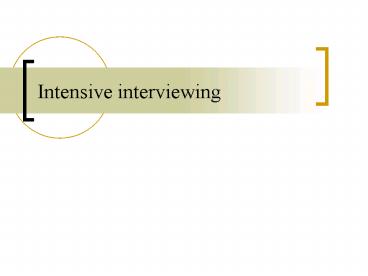Intensive interviewing - PowerPoint PPT Presentation
1 / 10
Title:
Intensive interviewing
Description:
Intensive interviewing relies on open-ended questions to develop a comprehensive ... Open ended questions. May be highly unstructured, or structured ... – PowerPoint PPT presentation
Number of Views:285
Avg rating:3.0/5.0
Title: Intensive interviewing
1
Intensive interviewing
2
Interviews
- An interview is a conversation between a
researcher (someone who wishes to gain
information about a subject) and an informant
(someone who presumably has information of
interest on the subject). - (Berger, Media and communication research methods)
3
Intensive interviews
- Intensive interviewing relies on open-ended
questions to develop a comprehensive picture of
the interviewees background, attitudes, and
actions - Open ended questions
- May be highly unstructured, or structured
- Interviews tend to be lengthy
- May be hours in length
- Becomes like a directed conversation
- Requires active probing of responses
- Learn about setting before interviewing
4
Preparing for the interview
- Study the topic
- Know the language used to describe the content
area - Know the respondent, if possible
- Plan an outline of topics to cover in an
interview - Grand tour questions open ended questions that
are designed to elicit lengthy narratives - Be ready to begin interviewing at any point from
initial contact on - Provide a compelling reason why the person should
be willing to talk to you - I make 100 an hour and you are on the clock
5
Sampling
- Random selection of informants is rare
- Typical group members
- Experts
- Demanding interviewees
- Select interviewees who
- Are knowledgeable on the subject of interest
- Are willing to talk
- Represent a range of perspectives from within a
group - Selection of new interviewees should continue
until a saturation point is reached, that is,
until new interviews yield little additional
information
6
Establishing and maintaining rapport
- Do not violate standards of social behavior
- Show respect for your interviewee
- Do not react in a negative manner to what she/he
says - Demonstrate your appreciation for the time and
effort the respondent provides you - Assure the informant of confidentiality
- Show interest in interviewee early in the
interview - Early in the interview, explain clearly the
purpose of the interview - Be mindful of pace
7
Asking questions and recording answers
- Plan questions around an outline (but be flexible
in terms of divergences and topic order) - Make questions short and to the point
- Use nondirective probes
- um humh anything else silence
- Follow up questions should be tailored to answers
- Clarifications should be specificnot What do
you mean? - When a respondent is on a roll do not try to
change direction - Unless the respondent is simply repeating
himself/herself
8
Data collection
- Tape recorders are a good idea and usually are
ignored - Constant note-taking is a distraction
- However, some respondents will give away good
information when the tape recorder gets turned
off
9
Triangulation
- Combining participant observation and intensive
interviewing can deepen understanding - May follow up experiment with depth interviews
- May call back selected survey participants to
conduct depth interviews - Etc.
10
Sources
- Schutt, R. K. (2004). Investigating the Social
World, (4th ed.). Thousand Oaks, CA Pine Forge.































